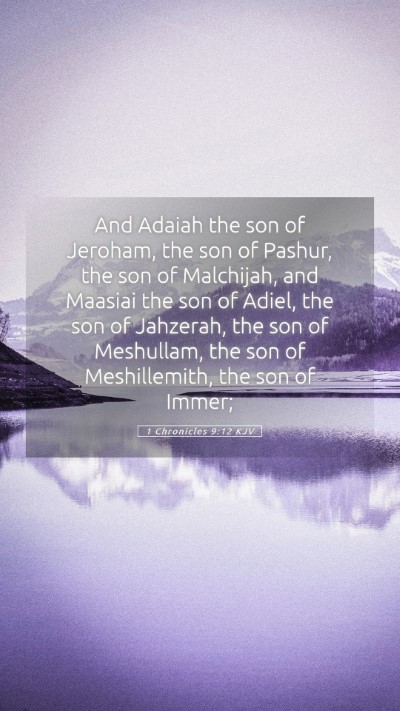Understanding 1 Chronicles 9:12
This verse is a part of the genealogical records found in the Chronicles, emphasizing the importance of heritage and service in the temple. It states:
"And Adaiah the son of Jeroham, the son of Pashhur, the son of Malchiah, and his brethren, heads of the fathers, a thousand and two hundred." (1 Chronicles 9:12)
Bible Verse Meanings
1 Chronicles 9:12 illustrates the significance of the Levitical priesthood and the temple service. The verse highlights the descendants of notable families who held important positions and were responsible for spiritual leadership among the people of Israel.
Bible Verse Interpretations
This verse reflects on the revival of priestly lineage and the reestablishment of worship after the Babylonian exile. The mention of specific family lines underscores the continuity of faith and tradition.
Bible Verse Understanding
Understanding this verse involves recognition of the historical context of the Babylonian exile and return. It serves as a reminder of God’s faithfulness to His people through the generations and the importance of maintaining spiritual integrity.
Bible Verse Explanations
The names mentioned in this verse carry weight, conveying that each individual played a role in the collective memory and worship practices of Israel. Adaiah represents a line of faithful ancestors, encouraging deeper reflection on one’s own spiritual heritage.
Bible Verse Commentary
According to Matthew Henry, this verse showcases the importance of accountability in leadership roles within the church, calling attention to the duties entrusted to priests and Levites. It emphasizes the need for strong, God-fearing leaders to guide the people.
Albert Barnes states that these genealogies serve multiple purposes, including confirming divine promises and recording the faithfulness of God across generations. The lineage is essential for establishing identity and inheritance among the Israelites.
Adam Clarke elaborates on the significance of family roles highlighted within these genealogies and advocates for the recognition of one's heritage. It speaks to a deeper understanding of identity in relation to one's community and faith.
Scripture Analysis
Analyzing 1 Chronicles 9:12 reveals layers of meaning that encompass not only the individual but also the broader community. The verse invites reflection on how the past informs present identity and purpose.
Biblical Exegesis
In-depth exegesis of this verse would explore the connections between the genealogies in Chronicles and the overarching narrative of the Old Testament, emphasizing the theme of redemption and God's covenantial promises.
Bible Study Insights
- Historical Context: Understanding the background of the Babylonian exile sheds light on the function of these genealogies in restoring identity.
- Spiritual Leadership: The verse prompts discussions on the qualities needed in leaders within the faith community.
- Continuity of Faith: It reinforces the notion of passing down beliefs through generations and the importance of heritage.
Meaning of Bible Verses
The essence of 1 Chronicles 9:12 revolves around accountability, heritage, and service. It can inspire modern readers to consider their own spiritual lineage and the role it plays in their lives today.
Understanding Scripture
As one delves into understanding this scripture, it becomes apparent that the names listed are not mere historical records but serve as spiritual signposts that guide faith and practice.
Cross References
- 1 Chronicles 6:31-38 (genealogy of the Levites)
- Nehemiah 7:39-42 (city dwellers and their roles)
- Ezra 2:36-39 (listing of priests returning from exile)
Application of Scripture
Contemporary application encourages believers to think about their role within their community and how they can continue in the faith traditions established by those before them. It also calls for self-examination in leadership contexts.
Conclusion
1 Chronicles 9:12 serves as a rich text for exploration within Bible study groups, allowing members to reflect upon their own spiritual heritage and the continuing narrative of faith. This verse, while listing names, calls to attention the story of God’s people and the importance of leadership founded on faith and integrity.


